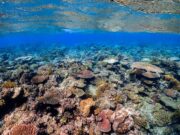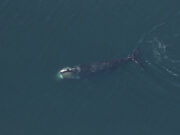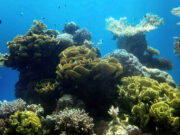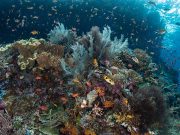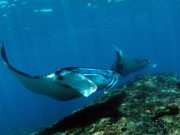Main photo credit: Australian Institute of Marine Science (CC BY 4.0)
Underwater robots are regularly used by the oil and gas industry to inspect and maintain offshore structures. The same machines could be adapted to gather extra scientific information, thus boosting environmental and resource management capabilities, an Australian-led study has revealed.
Scientists from around the globe, led by Dianne McLean and Miles Parsons from the Australian Institute of Marine Science (AIMS), are urging closer ties between industry and researchers to maximise the use of the underwater robots, known as remotely operated vehicles (ROVs).
In a paper published in the journal Frontiers in Marine Science, they identify a range of instruments that can be easily added to the craft, including cameras, audio recorders and sample collectors.
The information gathered will significantly increase scientific and industry understanding of the impact of marine infrastructure, producing benefits for ecological management and regulatory compliance.
“This is a real win-win,” said Dr McLean. “With some low-cost engineering and operational tweaks, industry and science can use ROVs to fuel new scientific discoveries. For instance, we could better understand the influence of structures such as platforms and pipelines in marine ecosystems – to the mutual benefit of the resource company and the environment.”
McLean, a fish ecologist and specialist in underwater video systems, and Parsons, an acoustics expert, teamed up with colleagues in Australia, the US, England and Scotland to identify feasible, cost-effective ways in which standard work-class ROVs could be adapted to expand their data-gathering capabilities.

These include the addition of extra sensors, cameras, acoustic transmitters and receivers, and sample collection devices.
The research shows that small enhancements to the vehicles and how they are used now could provide substantial benefits to science and to resource companies in the long-term.
Top photo credit: AIMS (CC BY 4.0)
Further Reading
McLean, D L et al (2020). Enhancing the Scientific Value of Industry Remotely Operated Vehicles (ROVs) in Our Oceans. Frontiers in Marine Science. doi: 10.3389/fmars.2020.00220


